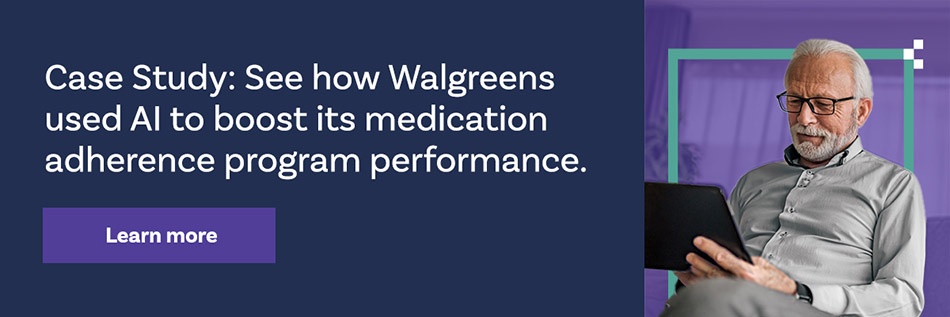Medication non-adherence is a significant challenge in healthcare today. Not only does non-adherence account for approximately 33-69 percent of hospital admissions, but it can also result in treatment failure, health deterioration, increased healthcare costs, poor quality of life, and negative health outcomes.
Patient support program outreaches can increase medication adherence, but only when the right strategy is in place. To implement the best strategy, manufacturers must tailor the communication to each patient by understanding their medication adherence barriers and meeting them where they are.
Let’s take a look at the primary medication adherence barriers and the strategies that can help patients overcome them.

Common Medication Adherence Barriers
Understanding what’s causing non-adherence and creating personalized experiences can improve health outcomes and address many of the common barriers to adherence, including:
Medication Costs
Cost is often a significant barrier to medication initiation and adherence. According to a study published in the Journal of the American Geriatrics Society, approximately two-thirds of patients with non-ventricular atrial fibrillation stated that medication cost was a primary reason behind non-adherence.
Many patients said they were not given enough guidance about medication costs. When they were given a coupon for their medications, it didn’t work or wasn’t valid. Some patients also skipped doses altogether to delay the amount of time before their next refill.
Forgetfulness
It’s very normal and human to forget things sometimes. However, forgetfulness is a common barrier to medication adherence across all patient populations.
Elderly patients and those in memory care are at higher risk of forgetting to take their medications. However, it’s also common for patients to have busy schedules and simply forget to take their medications. This is especially true for polypharmacy patients with complex regimens who are prescribed multiple medications.
Poor Communication
Many patients experience incomplete communication about their condition or medications. The clinician may not be offering enough instruction about their patients’ medications, so patients may believe their symptoms can be managed without taking the medication as prescribed.
Alternatively, they may think that they do not need to take the medication if they are not having symptoms. Some patients may start tapering their doses because they still have symptoms and do not believe the medication is working.
4 Strategies to Overcome Adherence Barriers
Now that we’ve discussed the most common medication adherence barriers, let’s take a look at some strategies to help patients overcome these obstacles.
1. Identify the Reasons for Non-Adherence
Helping patients overcome medication adherence barriers starts with identifying the patients who need the most support and learning what barriers they are experiencing. Are they forgetting to take their medication because they have a busy schedule? How are they organizing their medications? Is the cost of their medication driving them to skip doses or not fill prescriptions?
To deploy personalized, effective medication adherence strategies for each individual, it is integral to start the process with this conversation. This way, you have a solid understanding of the root causes leading to non-adherence, which will help guide your strategic approach to overcome them.
2. Educate Patients with Targeted Interventions
Targeted patient communications that educate patients on the importance of taking every dose of their medication on time can increase medication adherence. Some patients may not realize the full impact of skipping doses on their condition, whereas others may know very little about their condition and why.
In addition to educating patients on their condition, the therapy, and the importance of proper adherence, communications can address cost issues, access barriers, and other potential factors impacting adherence. For example, if cost is a concern leading to non-adherence, providing information about co-pay assistance, rebates, or other savings programs may improve the affordability of medications and, in turn, medication initiation and adherence.
3. Recommend Medication Adherence Tools
Countless tools can help patients remember to take medications as prescribed. For example, pill organizers and smart pill bottles are cost-effective ways to improve adherence. Smart pill bottles will send emails, text message alerts, or even glow with a reminder light, effectively reminding patients when it’s time to take medications. This is especially useful for time-sensitive drugs.
According to a study published in the Journal of Managed Care & Specialty Pharmacy, medication adherence was higher among patients who received a smart pill bottle with alerts compared to those who received one without alerts. In a post-study survey, approximately 60 percent of study participants positively rated the smart pill bottle with alerts.
4. Use AI to Improve Medication Adherence
Artificial intelligence (AI) technology can identify patients at high risk of becoming non-adherent. In using AI as part of a patient support program, pharmaceutical manufacturers can personalize every touchpoint by tailoring the channels, message, timing, and frequency to best suit each individual. Using AI enables targeting the right patients with the right message at the right time via the right channels – at scale – to promote therapy initiation and medication adherence.
AI can determine who is most at risk of non-adherence and predict the best outreach to achieve the best results rather than using a generic one-size-fits-all approach. Additionally, the AI gets smarter over time by continuously learning from patient behaviors, new data about them, and optimizing patient outreach.
AllazoHealth’s AI technology enables one-to-one patient engagement that improves initiation, adherence, patient experience, and health outcomes, while optimizing program performance, costs, and efficiencies. To learn more about personalizing patient communications using AI, visit Patient Support Programs.
